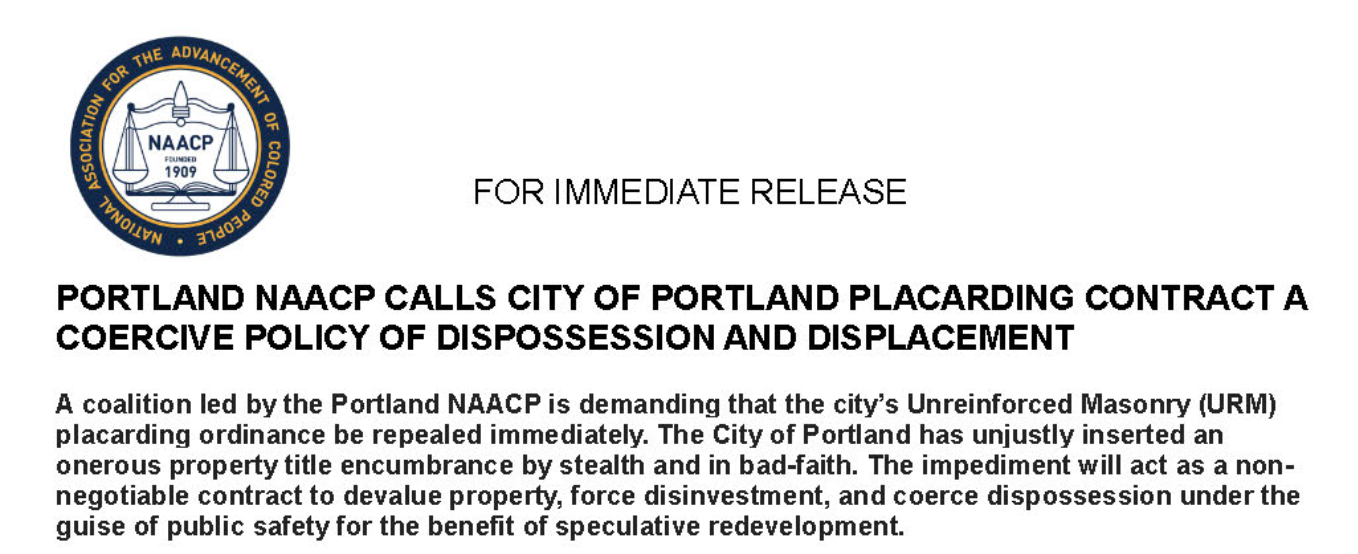“Redlining” is the practice of discriminating against a community by refusing to make loans, sell insurance, and provide services. It causes blight, suffering, injustice, displacement. Redlining was notoriously practiced in the historically African-American neighborhoods of North Portland, targeting our communities of color. But it doesn’t happen any more, does it?
Yes it does. The latest redlining is being orchestrated by the city and aimed at Portland’s older masonry (brick) buildings.
In October 2018, City Council passed a Placard Ordinance requiring a placard (sign) to be posted on thousands of Portland buildings listed in an unverified and unscientific city database of UnReinforced Masonry buildings (URMs), indicating that the building may not perform well in a major seismic event. In December 2018, city staff started “implementing” the ordinance by directing thousands of building owners to not only placard buildings, but also to sign a non-negotiable contract placing a legally binding deed restriction on the property. This permanent blemish on the property’s title could instantly violate encumbrance clauses of mortgages, disqualify owners from refinancing, and disqualify all potential conventional purchasers except cash discount buyers who trade in distressed mortgages.
These aren’t just words on a notice or deed. Building owners report that they are having difficulty getting loans and insurance, just because they are in the city’s database. When these notices are recorded on the titles, many will be cut off from bank financing – including loans to pay for seismic upgrades. This is modern redlining.
What are these buildings? Apartment buildings where thousands of Portland families find affordable housing. Commercial buildings where Portland’s small businesses run stores, restaurants, and workspaces. Churches and community centers where Portlanders join together and serve each other. Venues where Portland musicians perform. To see some of the buildings that are threatened, click here. These are beloved buildings in the Central City, North Portland, and all over our city.
Many buildings on the database are not even URMs; the city put buildings on the database based on a “drive-by” viewing and a one-page checklist, with no real inspection.
The result of the city’s action is that thousands of Portland’s older buildings may be cut off from financing and insurance, forced into distress sales, and fall into the hands of developers to be demolished. The new development is likely to be too expensive for the families, small businesses, churches, music venues, and other communities that are so important to Portland’s life, diversity, and vitality. Great for real estate developers. Not great for Portland.
This didn’t have to happen. An advisory group – appointed by the city – already developed a roadmap for practical seismic upgrades of Portland’s older buildings. This city-appointed group recommended 1) sensible upgrade standards, 2) no placard requirement, and 3) a program of tax credits to help fund these upgrades. The Mayor’s office ignored the work of its own advisors, pushed through the placard ordinance, and then the Mayor’s staff at the Bureau of Development Services turned “placard” into “compulsory title encumbrances”.
This doesn’t have to happen. On January 5, the Portland NAACP led a rally at City Hall to demand the repeal of the Placard Ordinance. The NAACP was joined by Music Portland (musicians and venues), Portland Tenants United (renters), Portland Assembly (active citizen democracy), Save Portland Buildings (owners trying to upgrade buildings), the Architectural Heritage Center (historic buildings and neighborhoods), Restore Oregon (our state’s leading historic preservation organization), Portland Business Alliance, 50 business districts in Portland, Oregon Chinese Benevolent Association, and others.
These groups are calling for the city council to REPEAL the placard Ordinance No. 189201 of October 10, 2018 and bring together everyone, not just real estate developers, to write its replacement.
From the Architectural Heritage Center and Restore Oregon joint statement:
We strongly support the Portland NAACP, Save Portland Buildings, MusicPortland, Portland Tenants United, Portland Assembly, CPPPAH, and other community groups calling for the City of Portland to suspend the October 10, 2018 Unreinforced Masonry (URM) ordinance and the December 14, 2018 Bureau of Development Services requirement of a hazard placard, deed title encumbrance, and compulsory agreement.
We join in the call for the city’s URM discussion to engage with all impacted community members to seek an inclusive, transparent, practical and fair solution with broad community and financial support.
Portland’s older masonry buildings are an important part of the cultural and architectural fabric of our city, and the communities and neighborhoods that depend on these buildings as places to work, perform, worship and live affordably. They are cornerstones of our community.
We believe that the right URM solution is positive, not punitive, and must combine appropriate seismic upgrades over a practical timeframe with robust and accessible financial assistance. It must promote preservation, not demolition, so these buildings can continue to serve all of Portland’s communities. It must not force the abandonment, and sale of these buildings or the displacement and dispossession of Portland’s vulnerable communities who rely upon them.
You can learn more at these links
Portland NAACP
If you would like to make your voice heard, you might let these persons know what you think:
Mayor Ted Wheeler mayorwheeler@portlandoregon.gov
Commissioner Chloe Eudaly Chloe@PortlandOregon.gov
Commissioner Nick Fish nick@portlandoregon.gov
Commissioner Amanda Fritz Amanda@portlandoregon.gov
Commissioner JoAnn Hardesty JoAnn@portlandoregon.gov
